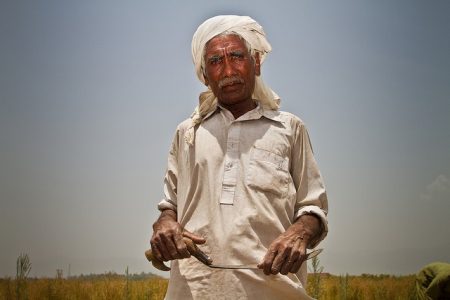
MEXICO CITY (CIMMYT) — Farmers in Pakistan that practice climate change adaptation strategies like adjusting sowing time, adopting new crops and planting drought tolerant varieties have higher food security levels and are less likely to live in poverty than those that don’t, according to a new study.
South Asia is likely to be one of the most affected regions by climate change due to the region’s vast agrarian population and large number of poor, unfavorable geography, limited assets and a greater dependence on climate-sensitive sources of income.
In Pakistan, climate change has had a direct impact on rain patterns and increased the frequency of extreme weather events such as flash floods. Adaptation measures at the farm level can help lessen the impact of these negative effects on food security.
Researchers from the International Maize and Wheat Improvement Center (CIMMYT) recently surveyed 950 farmers across Pakistan to see what adaptation measures to climate change they use, if any.
The study found that farmers in Pakistan are using a variety of adaptation practices to counter the adverse impacts of climate change, primarily adjusting sowing time, adopting new crops and planting drought tolerant varieties. The results also highlighted the importance of awareness and knowledge about the local context, climate change, adaptation and its benefits. Younger farmers and farmers with higher levels of education are also more likely to use these adaptation practices, as do farmers that are wealthier, farm more land and have joint families.
The authors of the study conclude that adaptation policies should focus on increasing the awareness of climate change and climate risk coping strategies and its benefits, as well as increasing the affordability of climate risk coping capacity by augmenting the farm household assets and lowering the cost of adaptation.
Read the full study “Assessing farmer use of climate change adaptation practices and impacts on food security and poverty in Pakistan” and check out other recent publications from CIMMYT staff below.
- Development of multiplex-PCR systems for genes related to flour colour in Chinese autumn-sown wheat cultivars. 2016. Zhang, Y., Wang, X., Jiang, L., Liu, F., Xinyao He, Liu, S., Zhang, X. In: Quality Assurance and Safety of Crops & Foods, vol. 8, no. 2, p. 231-241.
- DNA fingerprinting of open-pollinated maize seed lots to establish genetic purity using simple sequence repeat markers. 2016. Setimela, P.S., Warburton, M.L., Erasmus, T. In: South African Journal of Plant and Soil, vol. 33, no. 2, p. 1-8.
- Do forest resources help increase rural household income and alleviate rural poverty? Empirical evidence from Bhutan. 2016. Dil Bahadur Rahut, Behera, B., Ali, A. In: Forests, Trees and Livelihoods, vol. 23, no. 3, p. 1-11.
- Dwarfing genes Rht-B1b and Rht-D1b are associated with both type I FHB susceptibility and low anther extrusion in two bread wheat populations. 2016. Xinyao He, Singh, P.K., Dreisigacker, S., Sukhwinder-Singh, Lillemo, M., Duveiller, E. In: PLoS One, vol. 11, no. 9 : e0162499.
- A Bayesian Poisson-lognormal Model for count data for Multiple-Trait Multiple-Environment Genomic-Enabled prediction. 2017. Montesinos-Lopez, O.A., Montesinos-López, A., Crossa, J., Toledo, F.H., Montesinos-López, J.C., Singh, P.K., Juliana, P., Salinas-Ruiz, J. In: G3, vol. 7, no. 5, p. 1595-1606.
- A comparative political economic analysis of maize sector policies in eastern and southern Africa. 2017. Sitko, N.J., Chamberlin, J., Cunguara, B., Muyanga, M., Mangisonib, J. In: Food Policy, v. 69, p. 243-255.
- Agriculture and crop science in China: Innovation and sustainability. 2017. Yunbi Xu, Jiayang Li, Jianmin Wan. In: The Crop Journal v. 5, p. 95-99.
- Assessing farmer use of climate change adaptation practices and impacts on food security and poverty in Pakistan. 2017. Ali, A., Erenstein, O. In: Climate Risk Management, vol. 16, p. 183-194.
- Bayesian Genomic Prediction with Genotype x Environment Interaction Kernel Models. 2017. Cuevas, J., Cuevas, J., Crossa, J., Montesinos-Lopez, O.A., Burgueño, J., Pérez-Rodríguez, P., De los Campos, G. In: G3, vol. 7, no. 1, p. 41-53.
 Climate adaptation and mitigation
Climate adaptation and mitigation 
